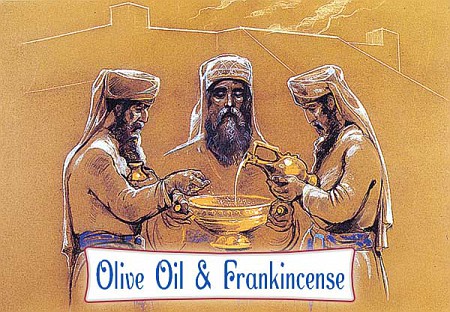Leviticus Chapter 2
Intro: The first offering we looked at in chapter 1 was the Burnt Offering. It was a voluntary offering, but also had atonement value because of the blood sacrifice that was made. The grain offering was sometimes given with the burnt offering or could be all by itself. It is also a voluntary offering of giving thanks to the Lord for His daily provision of bread. We do this today by thanking God for the spiritual bread given to us by Jesus who called Himself "the bread of Life" (John 6), but also thanking God for our daily bread as Jesus taught us to in the Lord's model prayer for us "Give us this day our daily bread..." There is symbolism that we will look at such as the flour (or wheat), the oil, the frankincense, the leaven, the honey, the salt - why were they not to use some and why were they to always offer it with salt? Let's look at it.
Leviticus Chapter 2 - Grain Offering
1. Who is this instruction for a grain offering directed to? vs. 1
2. What 3 things should a grain offering contain? vs. 1
Note: For us, fine flour is easy to come by and may not seem a costly sacrifice, but for them it was hard to come by in the wilderness where they were and it was a lot of time and effort to grind the wheat into flour each day. In fact they did the grinding on a rock.
3. The worshipper brings the offering to Aaron's sons the priests. What will the priest do with the handful of fine flour, oil, and frankincense? vs. 2
4. What will the offering be unto the Lord? vs. 2
5. Who does the remainder of the grain offering belong to? vs. 3
6. If the worshipper brought a grain offering baked in an oven, what was not to be in the bread? vs. 4
7. If the worshipper brought wafers spread with oil, what was not to be in the wafers? vs. 4
Note: Leaven (or yeast) would cause the bread to rise by fermentation which can lead to spoilage or corruption. Therefore, leaven is always used as a picture of sin in Scripture. Just as leaven spreads throughout the bread, sin is looked at that way also.
8. What does the apostle Paul tell us in regard to leaven and the spiritual picture it gives? Comment on the verse given below.
- 1 Corinthians 5:6-8 -
Note also that: Jesus warned His disciples against the leaven of the Pharisees, which was hypocrisy - outward righteousness and inward wickedness.(Luke 12:1) So when we acknowledge God as our perfect provider, and offer our lives to Him in service, it must be without leaven - without sin of malice, pride, and hypocrisy ... as a little sin can ruin a whole life, or even corrupt a whole church.
9. Back to Leviticus 2. If the grain offering was made on the griddle, it would be of fine flour, unleavened, and mixed with oil (vs.5). What was the worshipper to do to the griddle cake before offering it? vs. 6
Note: Oil was obtained by crushing and pressing the oil from the olives. Jesus was crushed for our iniquities ... and through His death and our belief and acceptance of Him as our substitution, ... we receive the anointing from the Holy Spirit. He sent the Spirit to us after He defeated death and resurrected from the grave. He ascended about 40 days later and sent the Promised Holy Spirit to His followers and those who would believe in Him through their testimony.
10. Throughout the Scriptures, oil is symbolic of the Holy Spirit. When we give back to God from what His hand has given to us, it cannot be in efforts of the flesh, but through the conviction of His Spirit moving upon our hearts in worship. What did Jesus say in John 6:63?
11. Back to Leviticus 2. If the grain offering was made in a pan - it would also be flour and oil - brought to the priest who would offer it up on the altar as a memorial portion to the Lord, an offer by fire as a sweet smelling aroma. (vs.7-9) What was to be done with the remainder of the grain offering? vs. 10
12. This principle of taking care of those who give all of their time in service to the Lord is seen in the New Testament also. What are we told in these verses?
- 1 Corinthians 9:13-14 -
- 1 Timothy 5:17-18 -
13. Back to Leviticus 2. What 2 things were not to be a part of the offering by fire to the Lord? vs.11
Note: We have already talked about how leaven was a picture of sin. Now we here about not putting honey with the offer. Honey ferments under heat and can spoil whereby the frankincense (bark from a tree much like cinnamon and other spices) will get sweeter as the fire is under it. It is good at times to evaluate our owns lives as an offering to the Lord...Do we get sweeter under the fire of trials or do we get more bitter and less useful under them?
14. What should be the result of the fiery trials that come into our lives?
- James 1:2 -4 -
- 1 Peter 1:6 -9 -
- 1 Peter 5:6-11 -
15. Back to Leviticus 2. Firstfruits were also brought to the Lord as a means of thanksgiving, but they would not be given on the altar for a soothing aroma. (vs.12) .. In regard to every grain offering, however it was presented, what was the requirement that it must have and why? vs. 13
16. Salt is the preservative of covenant between the Lord and His people. Salt is a perservative and also gives flavor to our lives. Let's look at some Scriptures where salt is spoken of. What do you learn from each of these about salt?
- Numbers 18:19 -
- 2 Kings 2:19-22 -
- 2 Chronicles 13:5 -
- Matthew 5:13 -
- Mark 9:50 -
- Colossians 4:6 -
17. Back to Leviticus 2. What were the instructions about early ripened things brought to the Lord for an offering? vs. 14
18. What would the worshipper put with the offering? vs. 15 - Name the 2 things.
19. Again, the priests would offer it up in smoke, and what would it be for our Lord? vs. 16
Application:
20. The grain offering represents Jesus, the Bread of Life. Comment on the verses where He claims this to be true:
- John 6:35 -
- John 6:48 -
21. Jesus was the kernel of wheat that fell into the ground to die so that He would rise up to bear more fruit through those that would believe in Him. Read these verses and comment on what you learn:
- John 12:24-28 -
22. As Jesus was broken and crushed on the cross, we too are asked to take up our cross and follow Him. As He was buried, and raised by the Holy Spirit of God, we have that same Spirit living in us today. We can see in this offering both a picture of self-denial, but also the thanksgiving to God of the daily provisions of material needs and spiritual needs. His name is Jehovah-Jireh, Our Provider. What ways will you give a sacrifice of thanksgiving today? How has this lesson help you be a better worshipper?
23. In conclusion, how does Paul tell us we can be a living sacrifice to our Lord?
- Romans 12:1,2 -
24. Summarize this chapter and post a prayer if you would like.



No comments:
Post a Comment